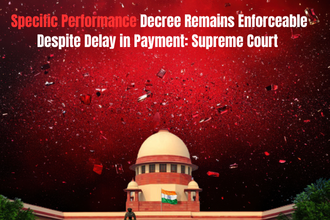In a significant interpretation of the Civil Procedure Code (CPC), the Supreme Court of India has ruled that Order XVIII Rule 17 CPC does not give any automatic right to the litigating parties to recall witnesses for further examination or cross-examination. The bench comprising Justice J.B. Pardiwala and Justice R. Mahadevan clarified that this power rests solely with the discretion of the court, and it must be exercised strictly for seeking clarification or removing ambiguities—not for rearguing the case.
This ruling settles a recurring dispute in civil litigation regarding whether a party can demand to recall a witness once the evidence has concluded. It upholds the sanctity of procedural discipline and reinforces the court’s control over the trial process.
What is Order XVIII Rule 17 CPC?
Order XVIII of the CPC deals with the hearing of suits and examination of witnesses. Rule 17 states:
“The Court may at any stage of a suit recall any witness who has been examined and may (subject to the law of evidence) put such questions to him as the Court thinks fit.”
The provision was introduced to empower the court to recall a witness on its own motion for the limited purpose of clarification. However, litigants have often misused this rule to reopen evidence or reintroduce cross-examination, leading to delays and derailment of trials.
The Supreme Court’s Observation
In the present case, the appellant had sought to recall a key witness after the evidence stage had been closed, ostensibly for further cross-examination. The trial court had rejected the application, observing that such recall was not intended to reopen the case. The High Court affirmed this view. Upon appeal, the Supreme Court upheld both lower court orders.
The apex court made it clear that:
“Order XVIII Rule 17 CPC does not confer any right on the parties to seek recall of witnesses. The rule is intended solely for the court to clarify doubts or ambiguities that may arise during the course of trial.”
Purpose and Limitations of Order XVIII Rule 17
The Court emphasized that this provision must be used sparingly and strictly for seeking clarifications, not for filling gaps in evidence or giving litigants a second chance.
Key takeaways from the judgment:
- Discretion lies only with the court: The parties cannot invoke Rule 17 as a matter of right. Only the court can decide whether to recall a witness.
- Limited purpose: The court can recall witnesses only to remove ambiguities or doubts, not for re-examination or cross-examination.
- Rule 17 is not a substitute for Order XVIII Rule 3 or Order XVI Rule 1: Where further examination is needed, proper procedures under other relevant provisions must be followed.
- No second innings for litigants: Allowing parties to recall witnesses at will would jeopardize judicial discipline and turn trials into endless rounds of evidence.
Judicial Precedents on Order XVIII Rule 17 CPC
The Supreme Court’s latest verdict is in line with its earlier decision in K.K. Velusamy v. N. Palanisamy (2011) 11 SCC 275, where it held:
“Order XVIII Rule 17 is not intended to be used for the purpose of filling up omissions in the evidence already led by a party.”
In that case, too, the apex court warned against misuse of the rule as a tool for rehearing or evidence manipulation.
Impact on Civil Litigation
This ruling is expected to have a far-reaching impact on the conduct of civil trials in India. It will:
- Prevent misuse of procedural law by parties seeking to prolong litigation.
- Ensure that trials adhere to timelines and are not derailed by unnecessary applications.
- Reinforce the authority of the court in managing the trial process.
- Encourage litigants and lawyers to present complete and clear evidence during the original examination itself.
Practical Guidelines for Litigants and Lawyers
In light of the judgment, litigants and counsel should bear the following in mind:
- Prepare thoroughly for witness examination: Treat the initial examination and cross-examination as final unless exceptional circumstances arise.
- Avoid filing recall applications casually: Courts are likely to reject such requests unless compelling clarification is genuinely required.
- Follow proper procedural channels: If further examination is unavoidable, invoke other applicable provisions like Order XVIII Rule 3, with adequate justification.
- Respect judicial discretion: Recall under Rule 17 is a judicial function, not a procedural entitlement.
Conclusion
The Supreme Court’s ruling provides much-needed clarity on the limited scope of Order XVIII Rule 17 CPC. By holding that the power to recall a witness vests solely with the court, the judgment puts an end to the practice of litigants using Rule 17 as a tactical weapon to buy time or manipulate the outcome of a case.
This verdict reinforces the principle that civil trials should proceed with discipline and efficiency, and it safeguards the integrity of the legal process.
As India seeks to modernize its civil justice system, such clear pronouncements will go a long way in reducing procedural abuse and ensuring fair, speedy, and just adjudication of disputes.


